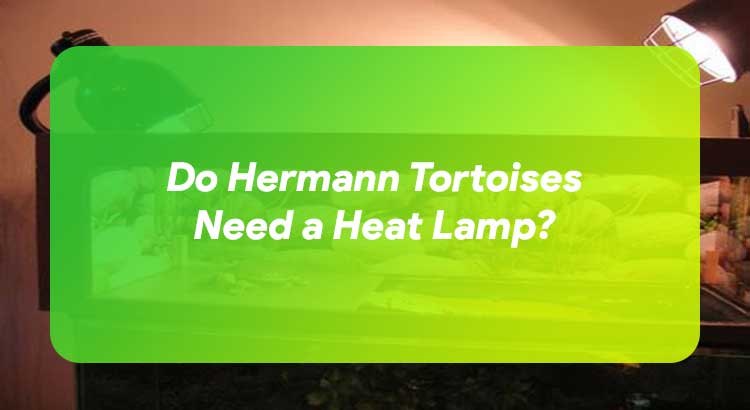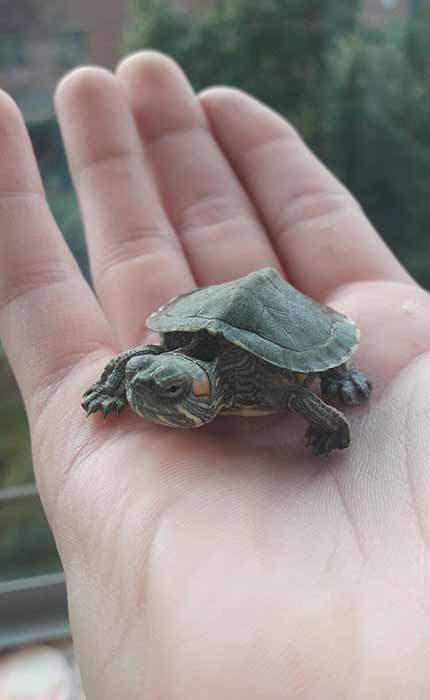It’s relatively easy to take care of a tortoise, they don’t need too many things. But the things that they need are essential to them. And one of those things is a heat lamp.
Hermann tortoises need a heat lamp in order to survive. Since Hermann tortoises are reptiles they can’t regulate their body temperature, so they have to rely on external sources like a heat lamp.
Every tortoise needs a heating lamp, but not every tortoise needs the same type of heat lamp. The temperature that a Hermann tortoise needs won’t always be the same as the needs of other tortoise species.
What Temperature You Want for Your Tortoise
So, all tortoises will need a heat lamp, but not all tortoises need the exact same temperature. So let’s take a quick look at what temperature you should be aiming for.
| Temperature Farenheit | Temperature Celsius | |
| Adult Hermann Tortoise | 90 – 95°F | 32 – 35°C |
| Juvenile Hermann Tortoise | 95 – 100°F | 35 – 37°C |
As you can see in the table above juvenile Hermann tortoises (younger tortoises) will need a higher basking temperature, so if your tortoise is younger than 2 years old you will need a slightly higher temperature.
Now we know what temperature we need, but how do we obtain it?
The Wattage
Most heat bulbs won’t say “this is a 95°F bulb”, instead they will say that this is a 50-watt bulb or a 75-watt bulb.
This is because a 50-watt bulb can generate 75°F as well as 105°F. The amount of heat a bulb will give is influenced by the distance from the ground.
Here is a table showing what temperatures you should expect depending on the distance.
Depending on the room temperature you might get slightly different temperatures, but the difference shouldn’t be significant.
As you can see the closer the bulb is to the ground/tortoise the more heat it will release. But there is a limit to how close you can get it. From my experience you shouldn’t get the bulb any closer than 4 inches, if you move it any closer there is a real chance that your tortoise will get burnt.
As for how far away you can move the bulb, the answer is pretty far. As long as your tortoise gets enough heat from the bulb, you can place it as far as you want.
Now I would like to cover a very important thing that I usually find on other sites and forums when heat lamps are discussed. The reason I want to discuss this is that it can be dangerous to tortoises.
Alternatives to Heating Lamps
There are two alternatives: one of them is not that bad, and one of them is terrible. So let’s start with the first one.
Mercury Vapor Bulbs
Besides a heat lamp, tortoises also need a UVB light. This basically means that they need two bulbs, one that provides heat, and one that provides UVB rays.
A Mercury Vapor bulb provides both of them. So the advantages are pretty clear, you save up space, and you have only one bulb to check, not two. But those are the only advantages, and they are not that impressive.
The cost of a Mercury Vapor bulb is the same as the cost of one heating, and one UVB bulb, so no difference here.
The disadvantage is that over time a few people complained that they explode. I don’t use one, so I don’t have any experience with them, so I have no idea if it’s true or not. In general, they have good reviews, but you will occasionally see a person who said that their bulb exploded. So my suggestion is to stay away from them. The advantages don’t make up for the risk.
If you don’t know too much about UVB light and why a tortoise needs it you should check out this article where I explain everything that you need to know: Guide for Lighting and Heating a Tortoise Tank and Basking Area.
Heat Pads
Heat pads can be great for other reptiles, they are great for snakes and lizards but for tortoises, they are just horrible. They don’t deliver heat in a way that is beneficial for a tortoise, so they are basically no good.
Tortoises need heat to come from above, not below. Due to the shape of the shell, heat coming from below will only be 35% as efficient as the heat coming from above. So in order for the heat pad to provide enough heat for a Red Eared slider who needs on average 90°F, it will have to reach almost 200°F, at which point it will be too hot for the tortoise to sit on it.
My Recommendation
Considering the alternatives I would recommend you to go with a standard heat bulb.
I am a long-time user of the Exo Terra Swamp Glo Basking Spot Lamp. Depending on your needs you can choose between the 50, 75, and 100-watt options. Those bulbs will last a long time and they will produce enough heat for your tortoises. Because I had no problems with them I didn’t feel the need to try too many other options since those bulbs worked great for me and my tortoises.
For the lamp fixture, I use this one that allows me to put both the light the UVB bulb and the heating bulb in the same place. Right now I am using both slots for two 75 watt heating bulbs and it still works great.
Another product that I find very helpful is this timer. This timer will automatically turn the lights on and off at certain time periods that you will set. This way you will never have to worry about forgetting to turn the lights on for your tortoise when you are leaving for work or school, this will make the whole process automatic. If you could purchase just one thing that could take care of the light and temperature of your tortoise’s basking area this would be it. Here is a link to Amazon where you can check the pricing: US Plug Format, EU Plug Format.
Another product that I find very useful is an infrared laser temperature measurer. At first, it might seem a little over the top but it actually is very useful and it can be used for other purposes too not just for checking the temperature of your tortoise’s basking area. It can also be used in the kitchen when you are making food, or to check the temperature in the room. Overall it’s extremely helpful and it can sometimes be fun to play with. And it’s not even expensive as you might have thought. Here is a link to Amazon to check the current pricing.
Now let’s go over the few remaining questions that might interest you on the subject.
Do Hermann Tortoises Need a Heat Lamp at Night?
No, you don’t have to keep the heat lamp on during the night. You should try to keep the heat lamp on for the same period of time the sun is up. This way you will simulate the same conditions from the outside.
But depending on where you live, winter days can be very short. So during winter, you should try to keep the heat lamp on a little longer than the time the sun is up.
What Can Happen if You Don’t Have a Heating Lamp
If you don’t have a heat lamp your Hermann tortoise will definitely end up with health problems.
One of the most common things that can happen is that your tortoise will catch a cold, which is something very serious for a tortoise. A cold is a respiratory infection and it can be fatal for tortoises if the infection is not treated, and the heating problem is not solved.
There are other bad things that can happen if your tortoise doesn’t have access to a heating lamp, and most of them will put your tortoise’s life at risk. The general idea is that nothing good can come out of it.
How Long Can Hermann Tortoises Stay Without a Heat Lamp?
Despite the fact that heat lamps are essential for tortoises, they can spend quite a lot of time without one. But long periods of time can have a negative effect on their health.
For a pet tortoise, I would say that they can safely spend one week without a heat lamp, but any more than that and they could end up with health problems.
Related Questions
How do I keep my Hermann tortoise warm at night? The best way to ensure that your tortoise is warm during the night is to ensure that the temperature of the room is high enough.
Will something bad happen to my Hermann tortoise if I forget to turn the lamps on? If you forget for only one day your tortoise should be fine as long as you don’t do this again. Tortoises can resist without light for some time but if you forget to turn the lamps on repeatedly your tortoise will start having health problems.
Can you use a regular light bulb for a Hermann tortoise? No, they don’t produce enough heat to replace a heating bulb, and they don’t produce enough UVB light to replace a UVB bulb.


